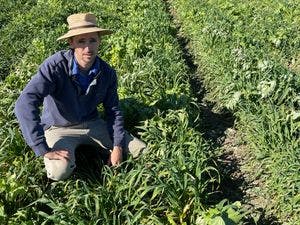
Case study: Parasitoids deployed by planes to protect crops!
9 February 2024

Sam Ward
Insect pests in Australia are becoming more and more resistant to insecticides across multiple chemical groups, reducing the chemicals’ efficacy and causing secondary pest problems. Responding to this challenge, Crop Capsules is a biological control company with an innovative method for delivering beneficial insects to the parts of the crops where they are most needed.
Olivia Bange grew up in Narrabri, NSW, and has always had a fondness for agriculture. She has worked in cropping systems for as long as she can remember, studying agricultural science at the University of Queensland, before landing a role at Crop Capsules a year ago. Describing her role at Crop Capsules is difficult as she has a very varied day-to-day job! Olivia deals with orders, and communicates with current and potential clients, providing advice and recommendations. Her great love is being out in the field, which she finds helps her understand the dynamics between the released beneficials and natural populations.

Olivia says that the new Crop Capsules technology “is a distribution method for beneficial parasitoids over large scale areas in broad acre cropping systems. Using a beneficial insect containment system, we drop beneficial parasitoids from a light aircraft into the designated field, releasing 1-2 capsules per hectare…it is a fast and economical method of releasing parasitoids over a large-scale system. This control method is more of a prevention management method, rather than reactive. The idea is to sustain the pest at a level below economically damaging thresholds using beneficial insects.”

Founded by agronomists Anna and Steve Madden, the company emerged from the need to address the overuse of insecticides in the mid-90s, particularly against silverleaf whitefly. Olivia explains it took a while to get the methods right. “They sprinkled the parasitoids Eretmocerus hayati in the field at 2am, however, knew this was not great in practise long term! So, they started using drones, but these were limiting over such a large area and would often clash with the timing of irrigation or less than ideal weather. This too gave them headaches!” To overcome the challenges of limitations in coverage, clashes with weather, and timing issues, the capsule delivery system was developed, a pioneering distribution method for beneficial parasitoids, specifically designed for large-scale areas in broadacre cropping systems.
Olivia explains that the idea of Crop Capsules is “to be another tool in a toolbox for growers. Our product can be used pre-emptively as part of the management system (as is already the case in the horticultural industry). This is turn will help to reduce the overreliance on chemicals.”
The capsule is made from a biodegradable, compostable material developed from corn-starch and vegetable oil. Capsulesare environmentally friendly and do not generate microplastics as they break down in the soil. The capsules are a unique containment system with features that promote insect health, survival rates and rapid reproductive activity on emergence. Fertilisedfemale parasitoids quickly depart the capsule in search of the target pest or its eggs.
The capsules are produced and packed in Australia.. Capsule components are moulded in Melbourne and the parasitoid wasps are reared at Australian insectaries. The components are freighted to Wee Waa (the location of Crop Capsules) where the capsules are packed and built. After assembly the capsules are delivered to our aerial operators and flown to site and released into designated fields.
“We release our capsules using a light aircraft, on which a device is installed to deploy parasitoids (developed for this purpose). The capsules are dropped from a small hole in the plane and at a regulated rate set by the pilot. The plane can cover thousands of hectares in just a few hours with this method.”

This unique deployment method, deploying 1-2 capsules per hectare, offers a rapid and cost-effective approach to releasing parasitoids over expansive agricultural systems in just a few hours. Olivia explained, “This control method is more of a prevention management method, rather than reactive. The idea is to sustain the pest at a level below economically damaging thresholds using beneficial insects.”
Crop Capsules primarily operates in cotton but extends its services to canola, corn, and pecans. Crop Capsules' versatility and commitment is highlighted by Olivia, "We network with people to understand whether there is any demand for us to look at a particular crop. We are driven to sustain the beneficial/pest dynamic in all ecological systems, not just broadacre systems."
The process of selecting the right parasitoids is a tricky one. In order to avoid another ‘cane toad’ situation Olivia says “We are only using commercially reared beneficial insects from Australian insectaries that have been used in the industry for many years. There is a wealth of research on these insects that shows they are efficient in the field. They are also host specific.” The company emphasizes that these parasitoids naturally occur in the systems where they’re being deployed, positioning Crop Capsules as not just a distribution service but a safeguard, enhancing the parasitoid populations and protecting them from being wiped out before they do their job!
For Olivia, the proof is in the pudding, and she loves helping her clients achieve sustainable management practices. She says, “our product will supplement their systems for seasons to come. If they haven’t had to spray for the pest, then we see that as a success! Ultimately this is a win for the grower because they have reduced their reliance on a chemical spray that could be ineffective due to resistance built in the pest.”
